Our Curriculum of PRIDE
Curriculum statement:
Our philosophy of learning, delivered through our broad and rich Grove Road Curriculum, creatively embraces the essence of our vision to instil in our children the knowledge, skills and values to be happy, confident, independent and successful life-long learners.
Our PRIDE characteristics are the foundations of our curriculum and underpin what we believe makes a child happy, healthy and ready to learn. With these, children are able and willing to engage with the PRIME areas and, in turn, will be able to access the subject specialisms. Every child has a right to a fun, exciting, experience-led education that inspires, challenges and supports them in equal measure. The PRIDE characteristics, PRIME areas and subject specialisms are all interconnected and influence each other.
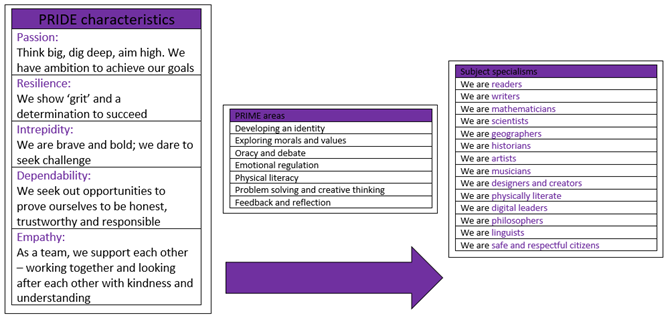
Our curriculum model encourages pupils to make discoveries, to be excited and to want to find out more. Learning is personalised and achievements are recognised and celebrated. The emphasis is on the development of skills and understanding and on encouraging learners to investigate and expand their subject knowledge through a range of activities designed for the individual. Our entire curriculum is underpinned by our PRIDE values, the core foundations of our school, and these are the key building blocks that we believe enable children to thrive in their learning. This has been built with reference to Maslow’s hierarchy of needs, where an individual must be supported holistically in order to develop higher order skills:
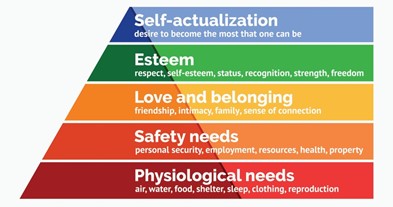
Credit:Simplypsychology.org
Once children have developed their PRIDE characteristics, they can then access the PRIME areas which are broken down into key phases and sections in line with Development Matters:
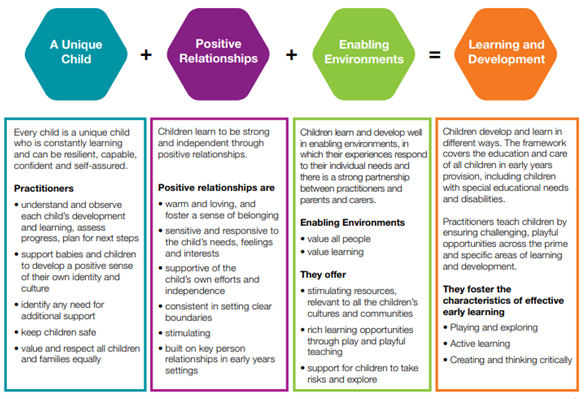
Each PRIME area is explored in detail in each phase (Early Years will work within Development Matters) and has been broken down into: what a unique child should be able to do at that age and stage; what adults can do and provide based on the positive relationships they maintain with the children and how the school environments will facilitate this. Each of the 7 PRIME areas is broken down below:
Developing an Identity
| Phase | What does 'healthy' look like? |
|---|---|
| KS1 |
Children are able to talk about themselves and their likes / dislikes with a familiar adult or peers. They enjoy being praised and can share the enjoyment of others when they are praised. Children are beginning to reflect on who they are and can speak respectfully about their own thoughts and opinions alongside those of their peers. Children are able to work with a range of others and have clear friendships demonstrated through their interactions with others. |
| LKS2 |
Children can speak about themselves in positive ways and can discuss what makes them unique. Children are beginning to make sensitive comparisons between themselves and others, noting similarities and differences. They show a good level of independence and self-motivation and can alternate effectively between this and collaborative teamwork with their peers. They have a broadening, diverse group of friends and are open to making relationships with new or unfamiliar peers. |
| UKS2 |
Children can speak about themselves in positive ways and can clearly articulate their feelings and emotions whilst listening sensitively to those of others. They can celebrate differences and recognise that everyone is unique and special. They are independent learners, able to self-motivate and apply themselves to all tasks given. They also connect socially with their peers and can sensitively recognise and reflect on the differences between individuals in society. Children are able to work alone, in pairs or in larger groups fluidly and can manage their interactions accordingly. Children are beginning to ask more questions about their identity, gender and sexuality with the support of familiar adults. |
|
Phase |
What can adults do and provide |
|---|---|
|
KS1 |
Adults will always praise in public and sanction in private. Every time praise is given it will always be qualified with why it was given (I like this because…) to support children in understanding specifically what was positive. Opportunities will be given for children to work with a variety of familiar peers within their social circle / class on a daily basis. Groups will be varied in size to allow children to explore relationships with different children. Adults will reflect on their cohort intake when planning units of work or choosing suitable texts to ensure a diverse selection is provided and children all feel represented. |
|
LKS2 |
Adults will always praise in public and sanction in private. Every time praise is given it will always be qualified with why it was given (I like this because…) with direct links to classroom expectations and learning tasks to support children in understanding specifically what was positive. Opportunities will be given for children to work with a variety of familiar peers within their social circle / class on a daily basis and they will be encouraged to interact positively with those around themselves. Groups will be varied in size to allow children to explore relationships with different children. Adults will reflect on their cohort intake when planning units of work or choosing suitable texts to ensure a diverse selection is provided and children all feel represented |
|
UKS2 |
Adults will always praise in public and sanction in private. Every time praise is given it will always be qualified with why it was given (I like this because…) with direct links to classroom expectations and learning tasks to support children in understanding specifically what was positive. Opportunities will be given for children to work with a variety of familiar peers within their social circle / class on a daily basis and they will be encouraged to manage conflict as and when it arises. Groups will be varied in size to allow children to explore relationships with different children. Adults will reflect on their cohort intake when planning units of work or choosing suitable texts to ensure a diverse selection is provided and children all feel represented |
Developing an Identity
|
Phase |
How does the school environment support? |
|---|---|
|
KS1 |
Tables will be arranged in clusters to support group work / Kagan structures. There will be regular opportunities for children to work as a whole class (carpet time), in groups, in pairs or independently (including in classroom provision). A range of languages will be evident in the classroom, as will texts from other countries / cultures to ensure that all children feel fairly represented within their classroom environment. |
|
LKS2 |
Tables will be arranged in clusters to support group work / Kagan structures. There will be regular opportunities for children to work in groups, in pairs or independently. A range of languages will be evident in the classroom (orally and displayed), as will texts from other countries / cultures to ensure that all children feel fairly represented within their classroom environment. |
|
UKS2 |
Tables will be arranged in clusters to support group work / Kagan structures. There will be regular opportunities for children to work in groups, in pairs or independently. A range of languages will be evident in the classroom (orally and displayed), as will texts from other countries / cultures to ensure that all children feel fairly represented within their classroom environment. |
Exploring Morals and Values
|
Phase |
What does 'Healthy' look like |
|---|---|
|
KS1 |
Children can clearly differentiate between right and wrong, discussing what makes a choice good or bad. They can reflect on poor choices with support and can discuss what they might do differently with a familiar adult. Children respond well to structure and adhere to expectations and routines set within a safe environment. Children understand cause and effect and are beginning to appreciate how their actions can impact on others. Children are able to move themselves away from things they do not agree with and can voice their concerns to a familiar adult. |
|
LKS2 |
Children have a sound understanding of right and wrong and can clearly articulate the differences between the two. They are able to empathise with others and understand how their actions impact on those around themselves. They can discuss the morals of decisions they make with support and they are beginning to explore the morals within the decisions of others around themselves. Children are beginning to manage conflict as and when it arises with the support of a familiar adult. |
|
UKS2 |
Children have a concrete understanding of expectations within the classroom and wider community. They understand the rule of law and can articulate the morals behind decisions made by themselves and others. They empathise with others and have a good understanding of how one person’s actions can impact on others positively or negatively at a range of scales. Children can manage conflict as and when it arises and may not always seek adult support when doing so. Children will be able to differentiate between morals and values whilst expressing their own. |
Exploring Morals and Values
| Phase | What can adults do and provide? |
|---|---|
| KS1 |
Adults will offer regular circle time to discuss choices alongside sharing stories with clear morals and dilemmas. These will infiltrate reading skills sessions where children will talk about what characters have done and what they might do the same / differently if they were in the same situation. |
| LKS2 |
Adults will offer regular opportunities to discuss choices alongside sharing stories with clear morals and dilemmas. These will infiltrate reading skills sessions where children will talk about what characters have done and what they might do the same / differently if they were in the same situation. Children will be involved in changes to classroom expectations |
| UKS2 |
Adults will offer regular opportunities to discuss choices alongside sharing stories with clear morals and dilemmas. These will infiltrate reading skills sessions where children will talk about what characters have done and what they might do the same / differently if they were in the same situation. Changes to law will be planned in and discussed and key moral changes in society (e.g. slavery) will be explored in great detail with reference to key figures and texts. |
| Phase | How does the school environment support? |
|---|---|
| KS1 |
Space and time to talk will always be provided alongside timetabled assemblies and circle times. Key questions and moral dilemmas will be modelled by staff regularly and within teaching environments (including areas of provision). |
| LKS2 |
Space and time to talk will always be provided alongside timetabled assemblies and circle times. Key questions and moral dilemmas will be modelled by staff regularly and within teaching environments (including areas of provision). |
| UKS2 |
Space and time to talk will always be provided alongside timetabled assemblies and circle times. Key questions and moral dilemmas will be modelled by staff regularly and within teaching environments (including areas of provision). |
Oracy and Debate
| Phase | What does 'Healthy' look like |
|---|---|
| KS1 |
Children can speak clearly and in full sentences, reflecting on the listener’s actions and changing their delivery accordingly (e.g. challenging the listener if they are not showing good listening skills). They will track the speaker and they understand how to take turns within conversation in pairs or groups. Children can voice their opinions and are starting to recognise that others may have different opinions to their own. They can listen to points made by others and can ask subsequent questions to seek clarity in the points being made. |
| LKS2 |
Children can speak fluently, reflecting on the listener’s actions and changing their delivery accordingly (e.g. challenging the listener if they are not showing good listening skills or projecting their voice more when speaking in front of a larger audience). They will track the speaker and use their body language, such as nodding or smiling, to encourage the speaker to continue without interruption. They understand how to take turns within conversation in pairs or groups. With support, children are beginning to share their own ideas and thoughts whilst sensitively listening to and challenging those from their peers. They can discuss contentious items as a pair or a group with some support. |
| UKS2 |
Children can clearly articulate or present their thoughts, opinions and ideas and can reflect on how their life experience might lead to them having certain dispositions or stereotypes. They are able to change their communication strategies accordingly based on the group they are talking to (e.g. pairs, whole class etc.) and they are beginning to experiment with the tone, speed and volume of their voice when addressing others. They can sensitively and clearly challenge viewpoints they disagree with and they will listen to and reflect on challenges made to their own thoughts and ideas. |
| Phase | What can adults do and provide? |
|---|---|
| KS1 |
Adults will plan in regular opportunities to discuss and share ideas within lessons on a daily basis. ‘Talk time’ will be clearly valued and every point made will be heard in full and respected. Kagan structures will be introduced throughout the school year, building up a bank of group / talking strategies within the cohort alongside regular use and modelling of stem sentences. Adults will model standard English at all times and will sensitively encourage children to speak in full sentences. Phonics lessons / interventions will be used to support children with accurate phoneme pronunciation. |
| LKS2 |
Adults will plan in regular opportunities to discuss and share ideas within lessons on a daily basis. ‘Talk time’ will be clearly valued and every point made will be heard in full and respected. Opportunities will be used to discuss and debate preferences within the classroom (e.g. what would you like to play on the ball court today?). Kagan structures will be used to facilitate paired and group conversations and debates alongside repeated use of stem sentences. Adults will model standard English at all times and will sensitively encourage children to speak in full sentences, often asking them to extend their thinking using conjunctions to clarify and explain their meaning. |
| UKS2 |
Adults will plan in regular opportunities to discuss and share ideas within lessons on a daily basis. ‘Talk time’ will be clearly valued and every point made will be heard in full and respected. Opportunities will be used to discuss and debate preferences within the classroom (e.g. what would you like to play on the ball court today?). A broad range of Kagan structures will be in place and used at regular intervals throughout the teaching process with increasing levels of independence from the children. Adults will model standard English at all times and will sensitively encourage children to speak in full sentences, often asking them to extend their thinking using conjunctions to clarify and explain their meaning. Debate club will be offered to facilitate deeper debates and scaffolding to support these, tracked by ‘debate webs’. |
Oracy and Debate
| Phase | How does the school environment support? |
|---|---|
| KS1 |
Stem sentences will be clearly displayed and overtly modelled within the classroom environment. All adults within the environment will scaffold standard English. Key vocabulary and spellings within topic foci will be clearly displayed and referred to on a regular basis. |
| LKS2 |
Stem sentences will be clearly displayed and overtly modelled within the classroom environment. All adults within the environment will scaffold standard English. Key vocabulary and spellings within topic foci will be clearly displayed and referred to on a regular basis. |
| UKS2 |
Stem sentences will be clearly displayed and overtly modelled within the classroom environment. All adults within the environment will scaffold standard English. Key vocabulary and spellings within topic foci will be developed by the children and clearly displayed and referred to on a regular basis. Debates and discussions will be actively encouraged within the classroom and school culture / environment. |
Emotional Regulation
| Phase | What does 'Healthy' look like? |
|---|---|
| KS1 |
Children are able to talk about how they feel and they recognise that we have a wide range of emotions. Children can ‘read’ the emotions in other people based on their facial expressions, body language and conversations and they are beginning to react accordingly with the support of familiar adults. When children are approaching a ‘crisis’ moment they are beginning to talk about how they feel and they can remove themselves from situations that are exacerbating their negative feelings. |
| LKS2 |
Children are able to talk about how they feel and they recognise and name the wide range of emotions they and others feel. Children can ‘read’ the emotions in other people based on their facial expressions, body language and conversations and they are beginning to react accordingly with the support of familiar adults. When children are approaching a ‘crisis’ moment they are beginning to talk about how they feel and they can remove themselves from situations that are exacerbating their negative feelings. |
| UKS2 |
Children are able to talk about the wide range of emotions that they and others feel and others feel. They can discuss, in detail, how these emotions impact on their physical and mental state and they recognise key ‘triggers’ that might cause them distress. Children can ‘read’ the emotions in other people based on their facial expressions, body language and conversations and they are beginning to react accordingly with the support of familiar adults. When children are approaching a ‘crisis’ moment they are beginning to talk about how they feel and they can remove themselves from situations that are exacerbating their negative feelings. |
Emotional Regulation
| Phase | What can adults do and provide? |
|---|---|
| KS1 |
Adults will provide opportunities to discuss feelings and emotions alongside a range of core texts (see school reading spine), songs and videos. Adults will overtly model and vocalise their feelings and emotions by ‘thinking out loud’ to share how they regulate their feelings and emotions in an appropriate manner. |
| KS2 |
Adults will provide opportunities to discuss feelings and emotions alongside a range of core texts (see school reading spine) and videos. Adults will maintain a ‘human’ element in their teaching by sharing their feelings and emotions with the cohort on a regular basis. Core stories and learning opportunities will be planned in to draw an emotional response from the children. This will be explored within due course and key learning points will be addressed. |
| UKS2 |
Adults will provide opportunities to discuss feelings and emotions alongside a range of core texts (see school reading spine) and videos. Adults will maintain a ‘human’ element in their teaching by sharing their feelings and emotions with the cohort on a regular basis, often sharing real-world examples and times where they have struggled or succeeded with managing their emotional responses to crises. Core stories and learning opportunities will be planned in to draw an emotional response from the children. This will be explored within due course and key learning points will be addressed. |
Emotional Regulation
| Phase | How does the school environment support? |
|---|---|
| KS1 |
THRIVE provision is in place in school to support children with their emotional regulation and wellbeing. Classrooms will be decluttered and will have muted colours (such as hessian displays) to manage sensory overload and support children with feeling comfortable within the school environment. Calm reading spaces will be available where children can visit when they need to take some time. |
| LKS2 |
THRIVE provision is in place in school to support children with their emotional regulation and wellbeing. This will be timetabled in, however the THRIVE space can be used when children are at ‘crisis’ point. Classrooms will be decluttered and will have muted colours (such as hessian displays) to manage sensory overload and support children with feeling comfortable within the school environment. Calm spaces (zen zones) will be available where children can visit when they need to take some time. There will also be calm spaces with talking time, colouring or drawing on the playground during breaks to support children in taking some time for themselves. |
| UKS2 |
THRIVE provision is in place in school to support children with their emotional regulation and wellbeing. This will be timetabled in, however the THRIVE space can be used when children are at ‘crisis’ point. Classrooms will be decluttered and will have muted colours (such as hessian displays) to manage sensory overload and support children with feeling comfortable within the school environment. Calm spaces (zen zones) will be available where children can visit when they need to take some time. There will also be calm spaces with talking time, colouring or drawing on the playground during breaks to support children in taking some time for themselves. |
Physical Literacy
| Phase | What does 'Healthy' look like? |
|---|---|
| KS1 |
Children are able to use their fine motor skills to grip a writing implement correctly with a tripod grip whilst writing in a range of positions (at a table, on the carpet etc.). They can also exercise control over equipment such as scissors, rulers and suitable sports equipment such as rackets and bats. Children have good balance and co-ordination and can negotiate space safely. They can use their gross motor skills to control apparatus and equipment and they are beginning to discuss the effects that exercise and diet have on their bodies. |
| LKS2 |
Children are able to use their fine motor skills to grip a writing implement correctly with a tripod grip whilst maintaining a suitable writing posture at a table. They can also exercise good control over equipment such as scissors, rulers and suitable sports equipment such as rackets and bats. They are beginning to explore more specialised equipment, such as compasses and protractors, and can use their existing skills to do so effectively. Children have good balance and co-ordination and can negotiate space safely and with increasing control. They can use their gross and fine motor skills to control a range of apparatus and equipment and they are increasingly confident when discussing the effects that exercise and diet have on their bodies. |
| UKS2 |
Children are able to use their fine motor skills to grip a writing implement correctly with a tripod grip whilst maintaining a suitable writing posture at a table for sustained periods of time. They can also exercise careful control over a wide range of equipment such as scissors, rulers, compasses, protractors and all relevant sports equipment. Children have good balance and co-ordination and can negotiate space safely whilst demonstrating agility and control at all times. They can use their gross and fine motor skills to control a range of apparatus and equipment and they are confident when discussing the effects that exercise and diet have on their bodies. |
Physical Literacy
| Phase | What can adults do and provide? |
|---|---|
| KS1 |
Adults will sensitively intervene and support with suitable pen grip, providing specialised equipment as and when required (e.g. pen grippers). Finger gym interventions, such as dough disco, will be offered for those who struggle with their fine motor skills and gross motor activities, such as parachute games, will be available on the school playground to support holistic physical development. Regular opportunities will be planned in where children can ‘move and shake’ during lessons – such as outdoor maths lessons. |
| LKS2 |
Adults will sensitively intervene and support with suitable pen grip. Finger gym interventions, such as flick football, will be offered for those who struggle with their fine motor skills and gross motor activities, such as climbing and obstacle courses, will be available on the school playground to support holistic physical development. Regular opportunities will be planned in where children can ‘move and shake’ during lessons – such as outdoor maths lessons. |
| UKS2 |
Adults will sensitively intervene and support with suitable pen grip. Finger gym interventions, such as flick football, will be offered for those who struggle with their fine motor skills and gross motor activities, such as climbing and obstacle courses, will be available on the school playground to support holistic physical development. Regular opportunities will be planned in where children can ‘move and shake’ during lessons – such as outdoor maths lessons. |
Physical Literacy
| Phase | How does the school environment support? |
|---|---|
| KS1 |
Provision spaces will include ‘fiddly fingers’ type activities to support children with developing their fine motor skills. Provision spaces and lessons will include opportunities for children explore and use a wide range of equipment as they being to develop control strategies when using them independently. |
| LKS2 |
A range of equipment and resources will be available for children to explore independently and with support. Children will have free access to this equipment within their learning to encourage exploration and they will be coached through specific uses within taught lessons or it will be scaffolded within the classroom environment. |
| UKS2 |
A range of equipment and resources will be available for children to explore independently and with support. Children will have free access to this equipment within their learning to encourage exploration and they will be coached through specific uses within taught lessons or it will be scaffolded within the classroom environment. |
Problem Solving and Creative Thinking
| Phase | What does 'Healthy' look like? |
|---|---|
| KS1 |
Children are able to explore and engage with new learning and areas of provision that are unknown to them within a familiar, safe environment. They ask questions and use their thinking skills to make links in their learning to solve problems and create solutions. |
|
LKS2 |
Children are able to approach unfamiliar problems or activities independently or as part of a group with some adult support in a safe environment. They are beginning to make connections to their prior learning and understanding to enable them to explore new things in a logical, thought-out manner. They enjoy the challenges that new things bring and they can discuss how challenges help them to learn and overcome boundaries with reference to the ‘learning pit’ |
| UKS2 | Children are confident when approaching unfamiliar problems or activities independently or as part of a group in a range of environments. They are able to make powerful connections to their prior learning and understanding to enable them to explore new things in a logical, thought-out manner. They enjoy the challenges that new things bring and they can discuss, in detail, how challenges help them to learn and overcome boundaries with reference to the zone of proximal development and learning pits. |
Problem Solving and Creative Thinking
| Phase | What can adults do and provide? |
|---|---|
| KS1 |
Adults will coach children through a range of strategies and systems that children can utilise within their learning. Links will be encouraged and publicly celebrated to support children with making connections within their learning. Adults will vocalise their thinking when solving problems to showcase their internal dialogue to the children in order to scaffold future learning. |
| LKS2 |
Adults will coach children through a range of strategies and systems that children can utilise within their learning. Links made will be showcased and publicly celebrated to support children with making connections within their learning. Children will be encouraged to lay out / talk through their thought processes to demonstrate their learning journey. Adults will vocalise their thinking when solving problems to showcase their internal dialogue to the children in order to scaffold future learning. |
| UKS2 |
Adults will coach children through a range of strategies and systems that children can utilise within their learning. Links made will be showcased and publicly celebrated to support children with making connections within their learning. Children will be encouraged to lay out / talk through their thought processes to demonstrate their learning journey whilst highlighting key aspects that helped them to make links with the support of a teacher. Adults will vocalise their thinking when solving problems to showcase their internal dialogue to the children in order to scaffold future learning. |
Problem Solving and Creative Thinking
| Phase | How does the school environment support |
|---|---|
| KS1 |
Challenge and exploratory tasks will be provided within the classroom environment and provision where children are actively encouraged to solve problems and make links in their learning. Stories (fictional and real) will be shared to demonstrate how others solve problems and use their creative thinking to overcome challenges. |
| LKS2 |
Challenge and exploratory tasks will be provided within the classroom environment and provision where children are actively encouraged to solve problems and make links in their learning. Stories (fictional and real) will be shared to demonstrate how others solve problems and use their creative thinking to overcome challenges. This will begin to include real-world visits and visitors so the children can understand the learning journeys of others in society. |
| UKS2 |
Challenge and exploratory tasks will be provided within the classroom environment and provision where children are actively encouraged to solve problems and make links in their learning. Stories (fictional and real) will be shared to demonstrate how others solve problems and use their creative thinking to overcome challenges. This will include real-world visits and visitors so the children can understand the learning journeys of others in society. |
Feedback and Reflection
| Phase | What does 'Healthy' look like? |
|---|---|
| EYFS |
Children are beginning to discuss what they are good at and what they would like to practise more. They can recognise familiar and unfamiliar activities and are beginning to take risks in their learning when accompanied by a familiar adult or friend. |
| KS1 |
Children can tell their talk partner / group about their colour tag at the beginning and end of a session. They might do this orally, using tokens or classroom corners to express how they feel. They can also confidently discuss their strengths and hobbies with a familiar adult or group. Children can discuss what part of the lesson and/or resources helped them and can ask for help as and when they feel red or yellow. Children can discuss what they like about a piece of work and what they would do differently. |
| LKS2 |
Children can reflect with talk partners and use reflection templates during metacognition lessons. Children are beginning to identify next steps in their learning and the learning of others and they can give simple feedback accordingly. Children can refer to which resources they found helpful within a session and can signpost these in feedback that they give to others. Children are beginning to explore a wider range of Kagan structures within their learning time. |
| UKS2 |
Children can reflect deeply on their learning using a range of prompts and formats. They can identify the strengths and next steps of themselves and others and can give concise, supportive feedback linked to specific learning criteria. Children can use a broad range of Kagan structures to facilitate high-quality discussion on a daily basis and they can critique their own work and that of others based on a class-generated list of success criteria. |
Feedback and Reflection
| Phase | What can adults do and provide? |
|---|---|
| EYFS |
Marvellous mistakes are often celebrated and adults provide regular opportunities for children to explore new things, prompting them to feel ‘red’ on a regular basis. Children are equally given opportunities to be experts in certain areas via classroom provision spaces and show & tell. |
| KS1 |
Children are introduced to the performance tag colours in new skills lessons at start of the year through activities such as corners. Colours are then introduced in carpet sessions in curriculum lessons. |
| LKS2 |
Children are reintroduced to the performance tag colours in new skills lessons at start of the year. The ‘learning pit’ will be used as a model for bouncing back after failure. Teachers will scaffold and provide a range of reflection templates and opportunities for children to reflect before and after sessions or units of work. Feedback opportunities will be planned in regularly, particularly within the drafting and crafting process. |
| UKS2 |
Children are reintroduced to performance colours, metacognitive skills and different approaches to learning during new skills lessons. The learning pit is extended to the ‘multiple learning pit’ and then the ‘learning vortex’ to show that learning has a gradual upward trend over time as we revisit skills we have come across before. Teachers will scaffold and provide a range of reflection templates and opportunities for children to reflect before and after sessions or units of work. Feedback opportunities will be planned in regularly, particularly within the drafting and crafting process. |
Feedback and Relationships
| Phase | How does the school environment support? |
|---|---|
| EYFS |
Children are introduced to the language of metacognition in the learning environment - e.g. growth mindset, perseverance, practice, determination. Metacognition colours are clearly displayed in the environment and around school so teacher and children can refer to them regularly. Books / stories / songs based on failure and success will be made available at all times. |
| KS1 |
The language of metacognition is commonplace around the environment, from staff and children, and the colour tags are clearly. Written reflections are celebrated on classroom displays and stem sentences are displayed to support self-reflection. Books / stories / songs based on failure and success will be made available at all times. |
| LKS2 |
The language of metacognition is naturally interwoven around the environment, from staff and children, and the colour tags are clearly displayed in the environment and in books. Written reflections are celebrated on classroom displays and stem sentences are displayed to support self-reflection. Powerful reflections will be shared in class assemblies and other communal times to celebrate across classes. Books / stories / songs based on failure and success will be made available at all times. |
| UKS2 |
The language of metacognition is naturally interwoven and uplevelling around the environment, from staff and children, and the colour tags are clearly displayed in the environment and in books. Written reflections are celebrated on classroom displays and stem sentences are displayed to support self-reflection. Powerful reflections will be shared in class assemblies and other communal times to celebrate across classes. Books / stories / songs based on failure and success will be made available at all times. |
Once children are working within the PRIDE Characteristics and PRIME areas then they are ready to learn within the subject specialisms. Each subject is planned for and taught with reference to flowcharts (examples below) that support with consistency and clarity across school:
Subject leaders maintain five key documents: topic webs (above), progression maps, long-term coverage plans (LTPs), medium-term planning templates (MTPs) and subject leader action plans. The progression maps (example below) lay out what a unique child should be able to do at each age and stage of their development in line with the National Curriculum and school Curriculum of PRIDE. This is then used to inform planning and teacher assessment across school:
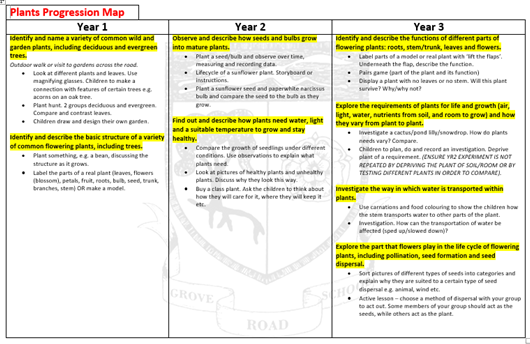
Thematic Learning & Topic Webs
Across each phase of school, teachers use a thematic approach to planning, putting together long-term curriculum overviews and half-termly/termly topic webs that advocate creativity, cross-curricular learning and active engagement (refer to the example curriculum overview and topic web below). These are shared with families via the school website to support them in joining their children on their learning journey:
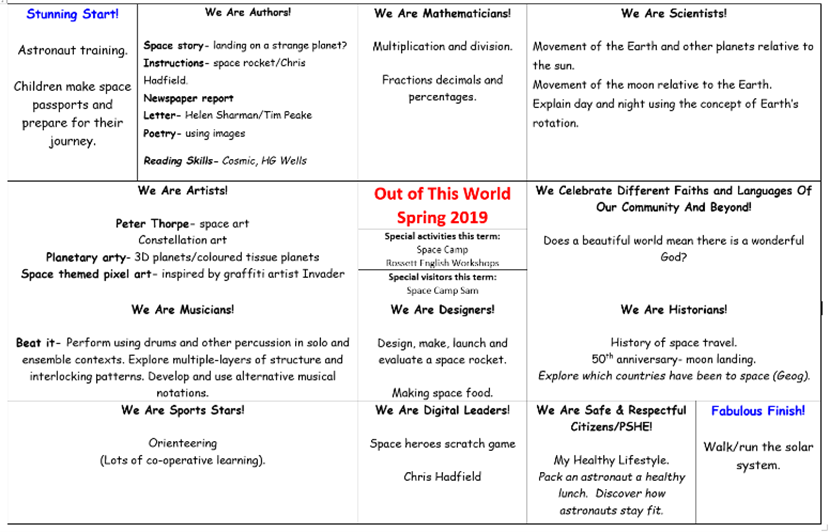
Each topic web is centred on a theme or topic that teachers believe will attract their pupils’ imaginations and interests, creating a ‘way in’ for various areas of the curriculum. Topic webs incorporate a ‘Stunning Start’ and ‘Fabulous Finish’. A ‘Stunning Start’ is a launch event, often rooted in suspended belief, that engages children in their learning; a focal point for the sequence of teaching that leads to multiple learning opportunities and avenues for investigation. This might include a space ship crash landing, a letter from the local MP, a special visitor or an archaeological find. A ‘Fabulous Finish’ is a ‘finale’ to a sequence of learning that creates purpose and closure to the children’s learning, such as a performance assembly where visitors are invited, writing to the Prime Minister or running a campaign to raise money for the World Wildlife Fund in order to protect wild animals.
Creativity and fun in planning for learning is a priority to ensure learning is enjoyable, active and challenging. The Social, Moral, Spiritual and Cultural aspects of learning are taken into account ensuring teaching reflects and celebrates our cultural diversity as a school.
 |
 |
|||
|---|---|---|---|---|
Metacognition |
Oracy |
.png)
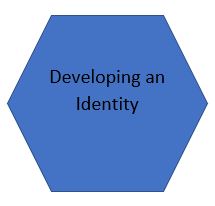
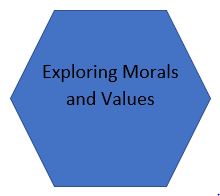
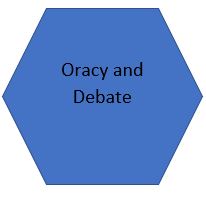
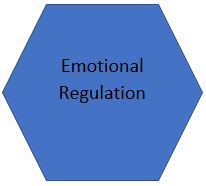
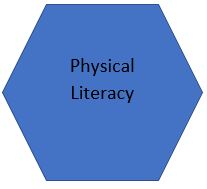
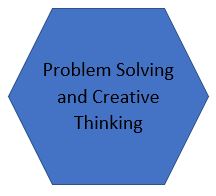
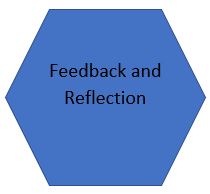
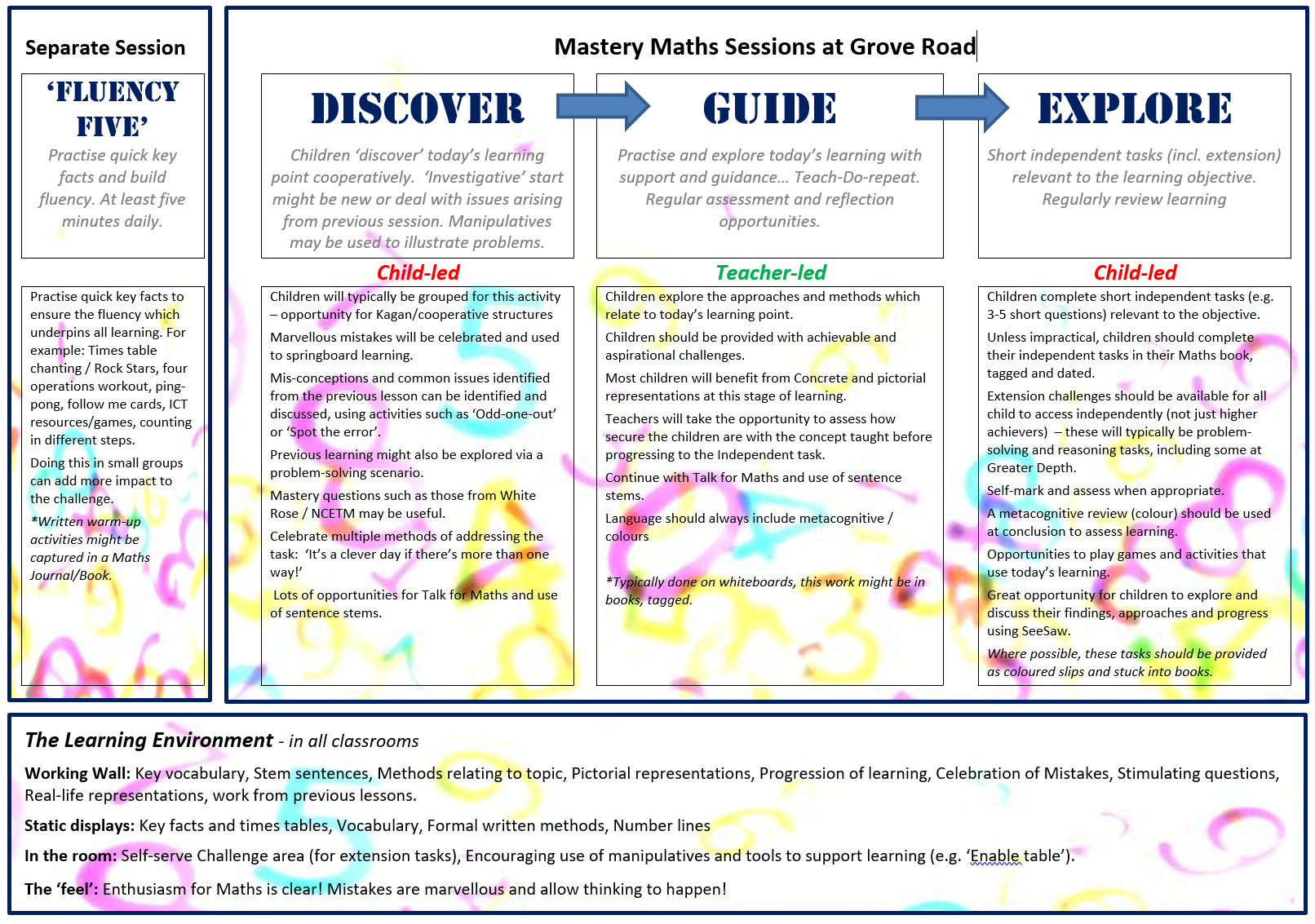
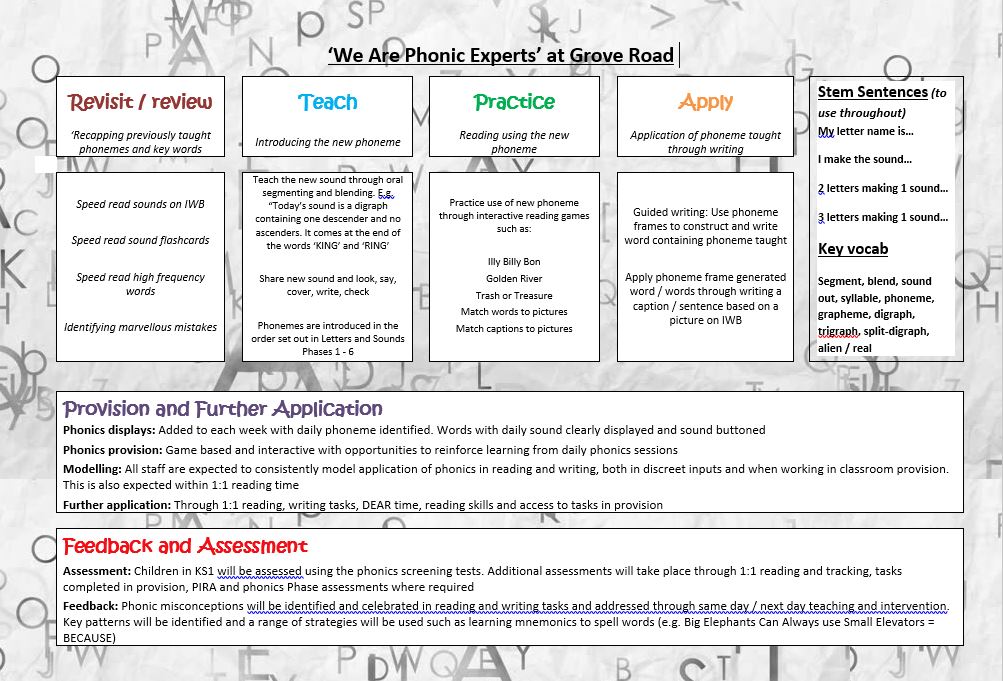
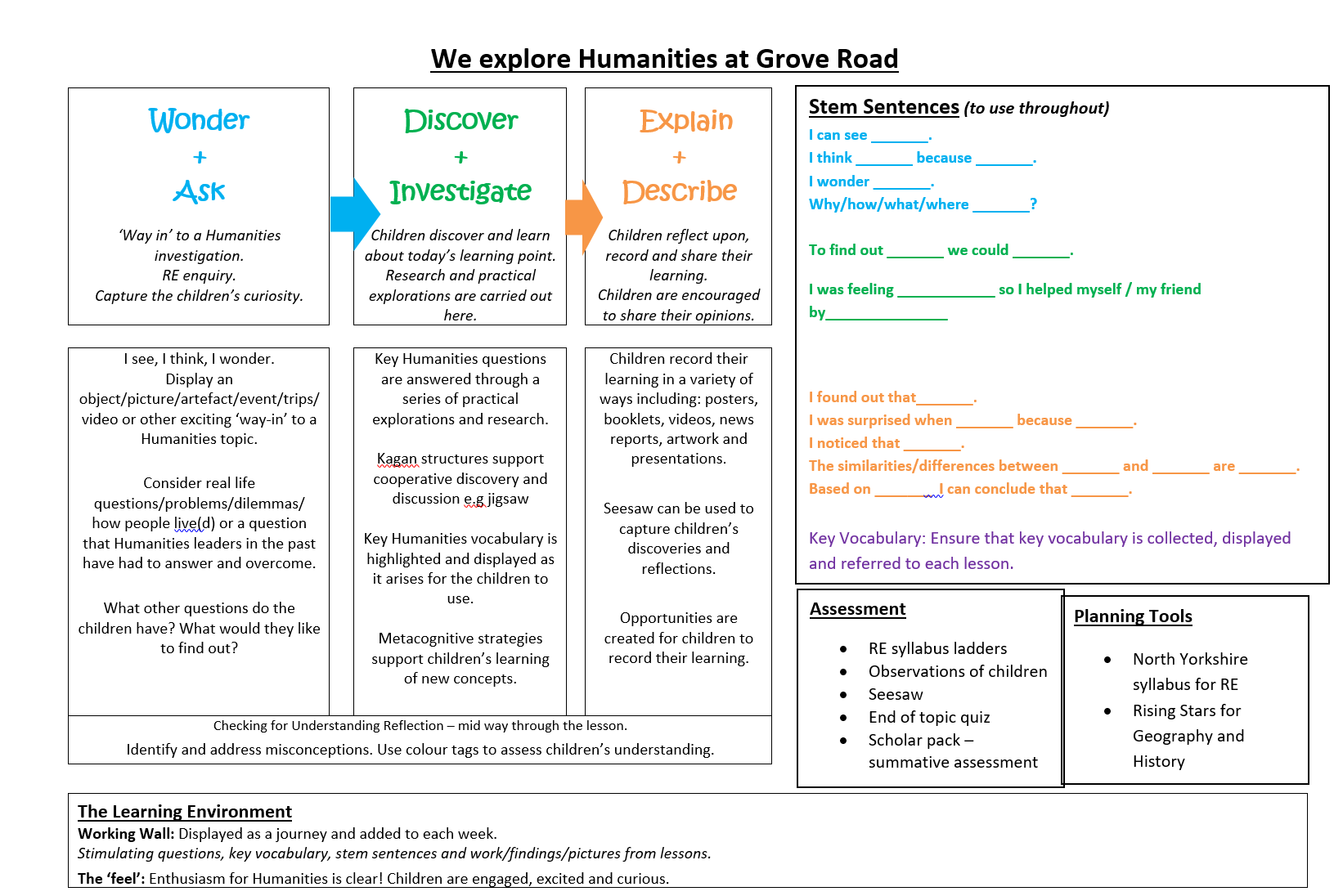
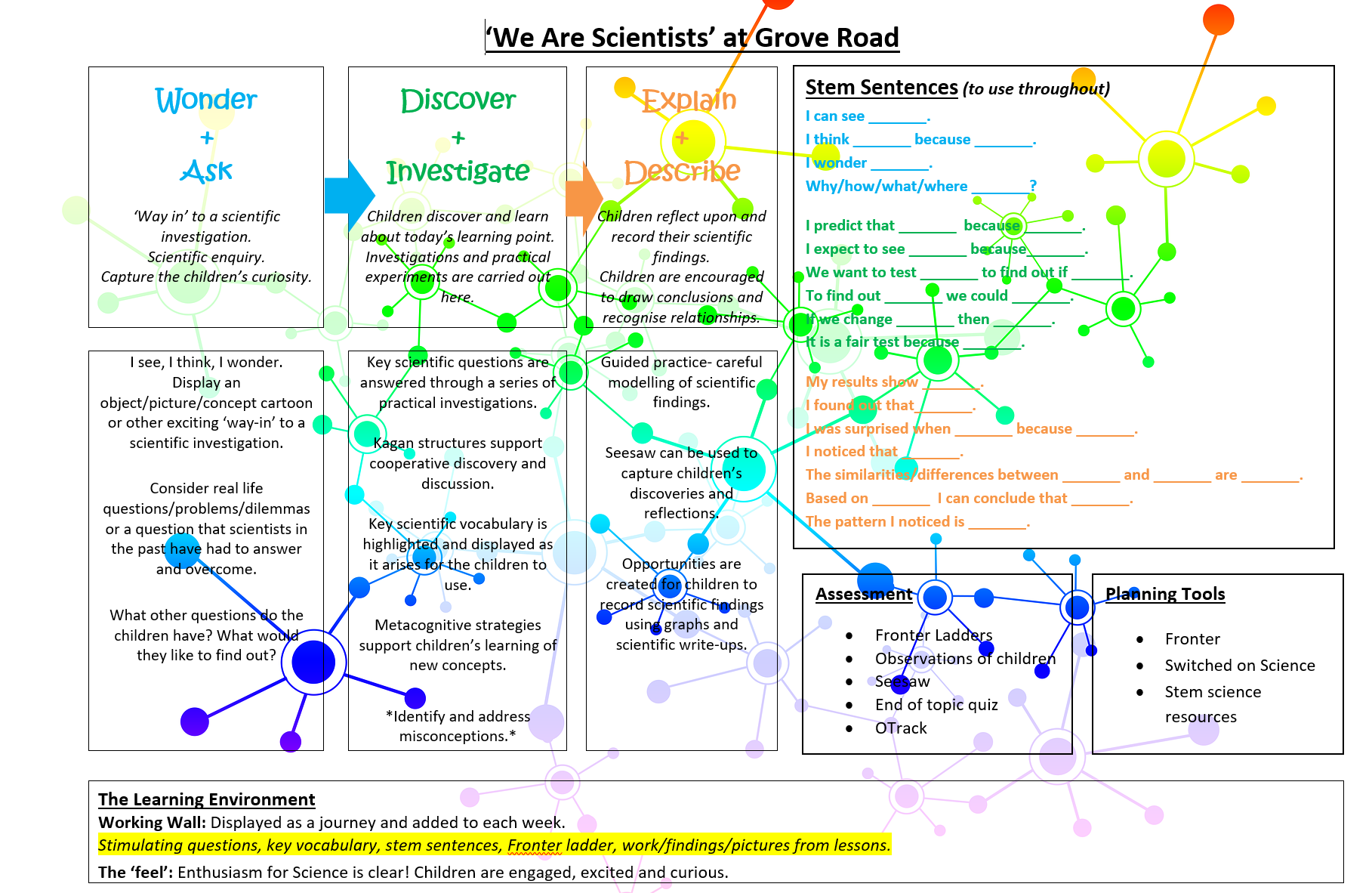
.JPG)
